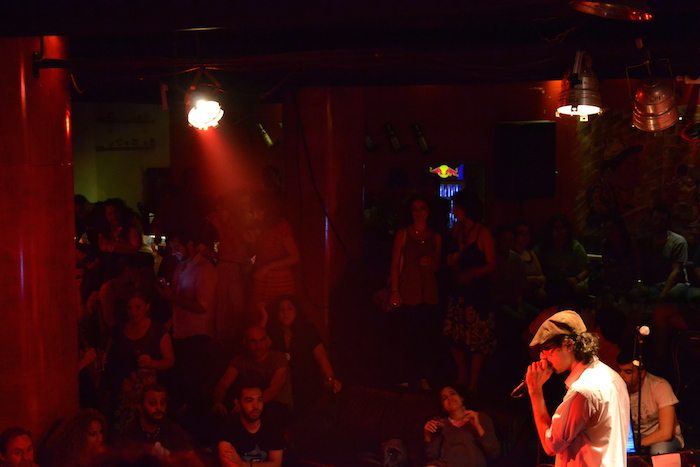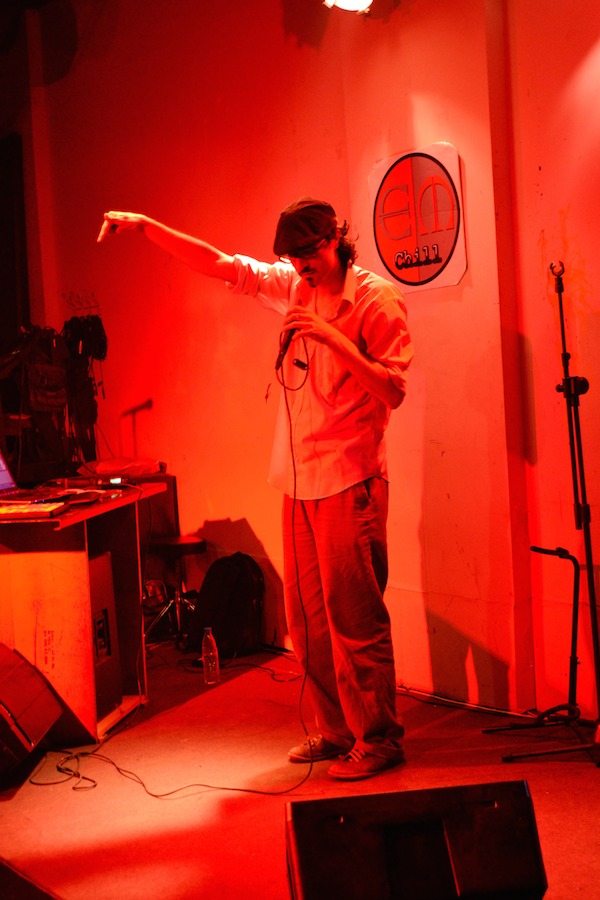The big brother of Arabic hip hop

Wael Kodeih, also known as Rayess Bek, is one of the creators of Arabic hip hop, together with Tamer Naffar from Palestine and Rabah from Algeria. They were the first in the 90s to start rapping in their countries’ dialects. To promote his new album, Rayess Bek is back with three anthology concerts organised in different Beirut neighbourhoods. The one and a half hour show is a mix of songs and words in both French and Arabic. The Lebanese rapper wants the audience to feel the way he does: pressed and suffocated by the social and political issues of the region. The public cannot help following the rapper’s rhythm, thinking about the truthfulness of the lyrics and asking for more. Mashallah News had the opportunity to meet with the big brother of Arabic hip hop.
Could you tell us more about your career?
I started rapping at the age of 15 and in 1997 a friend and I created hip hop group Aks’ser (Wrong Way), a group of hip hop. It was then that I got my stage name ‘Rayess Bek’, which is an expression designating a political leader. The other rapper called himself ‘Eben Foulen’ (the son of someone important) since there are so many of those in the country. It was essential for us to rap in Arabic, but it was badly received at the time. Some believed that hip hop should only be in English and others accused us of promoting US culture. But in the end, the group ended up having a lot of success, even though we did our albums with very limited financial means.
I got my stage name ‘Rayess Bek’, which is an expression designating a political leader.
I decided to start with my solo career in 2002 and published my first album 3am behkeh bel sokout (“Talking In Silence”). I continued after the 2006 war, which encouraged me even more. In 2010, Khartech Aal Zaman / L’Homme de gauche (“Shooting Time/The Leftist”) saw the day along with the ‘Rayess Bek orchestra’, which also performed in my concerts, composed of different traditional instruments like oud and nay [oriental luth and flute], bass, upright bass and groove box. Half of it was in French and the other in Arabic.
It was essential for us to rap in Arabic, but it was badly received at the time.
The new album “Hip Hop Republic” is like turning a new page, 10 years after my first solo record. I wanted to have a sort of closure. I collaborated with artists who I really appreciate, on a remix of my favourite songs from my previous albums.
Does hip hop play a role in the region?
It’s clear that it does when you look at what happened in the past few months. The first thing that went out, as soon as the internet connection was reestablished in Egypt was a rap song. Arab hip hop is the symbol of popular mobilisation. It unites the people in the streets with the rhythm and the lyrics. Of course we shouldn’t neglect the power of social networks like Facebook and Twitter. But music, since Oum Kalthoum and Sheikh Imam, has always been used to mobilise people, whether we like it or not. Today, rap is the only popular music that spreads the voice of the people. It works like a catalyst and this is very important.
What do you think about the alternative scene in the region?
With what is going on here, I think 10 years from now, we won’t be talking about Nancy Ajram or Haifa Wehbe anymore. These aren’t real artists, only money-makers. I am convinced that they are just a short-lived phenomenon. I yearn that we will be talking about people like Rabih Mroue: about those who deal with interesting subjects with a real artistic approach, after having done their research.
What underground music is suffering from is the belief that what comes from Europe is much better. It’s the white man complex.
What underground music is suffering from is the belief that what comes from Europe is much better. It’s the white man complex. I’ve been in this industry since 1995. But, since I appeared on French TV, people respect me more. Although showing up next to Tariq Ramadan or Alain Gresh for a few minutes doesn’t make me any different.
In your opinion, what are the similarities or differences between Western and Arabic hip hop?
Western hip hop has lost itself. It has fallen in the capitalist trap, with the multinational firms eating it from the inside. It is now just about gaining money, and the content no longer matters. This won’t happen in the region, for two reasons: first, since the internet took over, those firms no longer see the profitability of it so they will leave us alone. Second, there are so many themes to deal with in the Arab world. People have causes they fight for and so much to say. Hip hop is a great means to do so: it is what happened in the US in the 80s. For instance, it is not surprising that hip hop is literally booming in Palestine now.
People have causes they fight for and so much to say. Hip hop is a great means to do so: it is what happened in the US in the 80s.
You write your songs in Arabic and French. In which language did you start?
I started writing in French, but then realised that Arabic was essential. The sounds and tones of that language fit hip hop perfectly. Dealing with things about Lebanon, you have to do it in Arabic. The language I would use for a song depends on the theme that I choose. I don’t really think about the language issue, I just write the songs the way I feel is right.
Who do you think your message speaks to?
I believe I can bring together people who think like I do: the secular-minded, those who are against conservatism and for human rights. In other words, the people who want to change the system in Lebanon. I am only one voice among many, but we are not mobilised enough. The Laique Pride is a good initiative, but it’s not enough. Iskat al Nizam [the initiative “Bring down the system”, to reform the confessional system] is nothing next to what should be done. It’s not sufficient anymore. We aren’t fighting against a government like in Egypt or Tunisia, but against a people, or rather a mentality of the majority.
What social issues matter the most to you?
The things that upset me, like the lack of human rights and women’s rights. There are many themes that I haven’t dealt with yet, and I wish to do so. The problem I have is more about the tools than the topics. I’ve always wanted to talk about women’s rights in the Arab world, but this is very tricky. Not only because I’m not a woman, obviously, but also because of the lack of the right tool and angle, at least for now. There are so many issues to be dealt with, but what is missing is the artistic steps to transform an issue into a song, build from A to Z, without being superficial and fake. The gesture doesn’t matter, the content does. To just raise your fist doesn’t lead you anywhere.
What are the differences between ‘Hip Hop Republic’ and your previous albums?
“We aren’t fighting against a government like in Egypt or Tunisia, but against a people, or rather a mentality of the majority”
The beat is different, and there are no instruments in this album. On the previous one, I had incorporated a whole orchestra. Hip Hop Republic updates old songs that I like, and gives them a good lift. Then, my records are banned in most of the Arab world. I hope that this album will be allowed, especially with everything that has taken place. I think it will be sold in Egypt, maybe in Jordan, and hopefully in Syria too.
If you were to pick one of your songs that best describes you, which would it be?
I would choose Schizophrenia. I believe that we only write one good song in our lives, everything else is just derivatives and sub-topics of that song. There are so little things to say in life, but so many ways we could express it.
What does the word Mashallah make you think of?
It’s a hard question. It might look odd, but I think it has a sarcastic touch. I use this word when I want to make fun of stupidity, in social issues. It shows wonders why and how God was capable of creating something so full of nonsense. One should prostrate itself in front of such garbage. Now this is a very particular use of this word, in Lebanon, limited to those who listen to Ziad Rahbani or also to the non-believers.








One thought on “The big brother of Arabic hip hop”
Comments are closed.